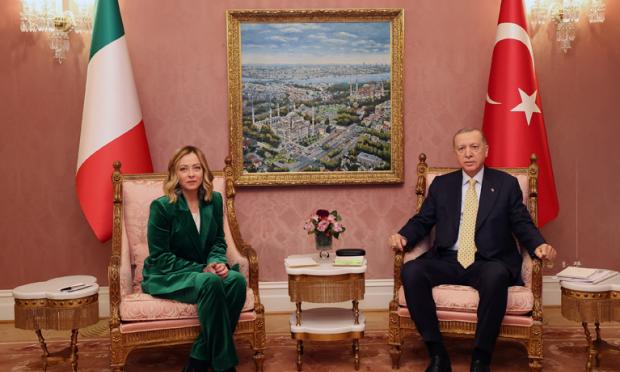Italian Prime Minister Georgia Meloni reportedly asked Turkish President Recep Tayyip Erdogan for help in stopping the flow of migrants and refugees from Libya during her visit to Turkey on Saturday.
Meanwhile, the Turkish side has proposed a joint agreement to be signed by Italy, Libya and Turkey.
Erdogan in the role of a leader to prevent the influx of migrants into the EU
The above points out International media, quoting:
"Erdogan, known for leveraging migrant issues, particularly those from Syria and Afghanistan, in his dealings with Europe, aims to establish himself as a leader in deterring migrant influx into Europe and the Mediterranean region.
While discussion in the pro-government Turkish media provides limited information about the meeting, reports from Meloni's side underscore her specific emphasis on leveraging Turkey's influence in Libya to address the issue of African migrants and traffickers entering Italy.
Turkey-Libya-Italy trilateral agreement on migration and security in the Mediterranean in the making
Turkey's proximity to Italy is reinforced by the fact that, unlike Greece, Italy does not oppose Turkey's operations in Libya.
Previously, preventing migratory flows from Libya was a common agenda between Italy and Turkey, prompting the foreign ministries of both countries to launch cooperation efforts.
There are claims in Ankara circles that President Erdogan has proposed to the Italian Prime Minister, in cooperation with Libyan Prime Minister Abdul Hamid al-Dbeybe, the possibility of a joint signing of a trilateral agreement.
This proposal is believed to include cooperation on issues related to migration and security in the Mediterranean region.
The military presence in Libya and the deployment of Syrian mercenaries
Turkey's close ties with the Libyan government have been accompanied by an increasing military presence in the country.
Last month, a presidential proposal proposing a 24-month extension of the Turkish military mission in Libya was approved by the Turkish parliament.
Stressing the importance of the Turkish navy's presence in the region, President Erdogan said the government's goal is to ensure national security against potential threats, including mass migration and terrorism, through the approved proposal.
With financial support from Qatar, Turkey has been actively involved in arming, training and supporting factions aligned with Erdogan's government in Libya since 2011.
Turkey has gone so far as to send Syrian fighters to Libya as mercenaries, providing them with monthly salaries and promising Turkish citizenship for both the fighters and their families.
The vetting and selection process of these fighters was carried out by the Turkish intelligence agency MIT, which has been working with jihadist groups in Syria since 2011 to overthrow President Bashar al-Assad.
Playing a critical role in the military success of the UN-backed Government of National Accord (GNA) against the rebel opposition led by Khalifa Haftar, Turkey supplied weapons, ammunition and drones and organized Syrian mercenaries and jihadists to fight Haftar.
In addition, on 2 January 2020, the Turkish parliament authorised the government to deploy military forces in Libya following a security cooperation agreement.
Haftar's attempt to seize Tripoli came to an abrupt halt after Turkey intervened with the supply of Bayraktar TB2 multi-purpose drones, manufactured by the Turkish company Baykar Makina, led by Erdogan's son-in-law Selçuk Bayraktar.
Erdogan's eye on Libya's oil and gas
Beyond ideological support, Erdogan openly acknowledged the strategic importance of Libya's oil and gas resources for Turkey.
During a joint press conference with former Libyan Prime Minister Fayez al-Sarraj in Ankara on June 4, 2020, Erdogan revealed plans to expand cooperation, including exploration and drilling operations, to exploit natural resources on Libyan soil.
The illegal Turkish-Libyan memorandum and the Turkey-Libya security agreement
In November 2020, Turkey and the GNA signed a military cooperation pact and a maritime delimitation agreement.
While the maritime agreement, which is not recognised by any other Mediterranean country, delimits the Turkish-Libyan continental shelf and the exclusive economic zone (EEZ), the security agreement allows the Turkish government to deploy its troops in Libya.
Human rights advocates are concerned that Erdogan is using the fear of irregular migration to European countries to shield his authoritarian regime from international criticism.
Migration has been a major topic of debate in the bloc's national parliaments since the beginning of the Syrian crisis, and the 2016 EU-Turkey agreement on migration allowed EU countries to return Syrian asylum seekers to squalid camps in Turkey.
The EU thus turned a blind eye to the undemocratic rule of the Erdogan regime in exchange for stronger controls on refugees leaving Turkish territory for Europe."




